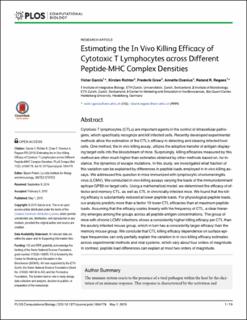Bitte benutzen Sie diese Kennung, um auf die Ressource zu verweisen:
https://doi.org/10.21256/zhaw-4704| Publikationstyp: | Beitrag in wissenschaftlicher Zeitschrift |
| Art der Begutachtung: | Peer review (Publikation) |
| Titel: | Estimating the in vivo killing efficacy of cytotoxic T lymphocytes across different peptide-MHC complex densities |
| Autor/-in: | Garcia, Victor Richter, Kirsten Graw, Frederik Oxenius, Annette Regoes, Roland R. |
| DOI: | 10.21256/zhaw-4704 10.1371/journal.pcbi.1004178 |
| Erschienen in: | PLOS Computational Biology |
| Band(Heft): | 11 |
| Heft: | 5 |
| Seite(n): | 1 |
| Seiten bis: | 13 |
| Erscheinungsdatum: | Mai-2015 |
| Verlag / Hrsg. Institution: | Public Library of Science |
| ISSN: | 1553-7358 |
| Sprache: | Englisch |
| Schlagwörter: | Adoptive transfer; Animals; Viral antigens; Computational biology; Immunologic cytotoxicity; Epitopes; Host-pathogen interactions; Lymphocytic choriomeningitis; Lymphocytic choriomeningitis virus; Major histocompatibility complex; Mice; Peptides; Cytotoxic T-lymphocytes; Viral proteins; Immunological models |
| Fachgebiet (DDC): | 571: Physiologie und verwandte Themen |
| Zusammenfassung: | Cytotoxic T lymphocytes (CTLs) are important agents in the control of intracellular pathogens, which specifically recognize and kill infected cells. Recently developed experimental methods allow the estimation of the CTL's efficacy in detecting and clearing infected host cells. One method, the in vivo killing assay, utilizes the adoptive transfer of antigen displaying target cells into the bloodstream of mice. Surprisingly, killing efficacies measured by this method are often much higher than estimates obtained by other methods based on, for instance, the dynamics of escape mutations. In this study, we investigated what fraction of this variation can be explained by differences in peptide loads employed in in vivo killing assays. We addressed this question in mice immunized with lymphocytic choriomeningitis virus (LCMV). We conducted in vivo killing assays varying the loads of the immunodominant epitope GP33 on target cells. Using a mathematical model, we determined the efficacy of effector and memory CTL, as well as CTL in chronically infected mice. We found that the killing efficacy is substantially reduced at lower peptide loads. For physiological peptide loads, our analysis predicts more than a factor 10 lower CTL efficacies than at maximum peptide loads. Assuming that the efficacy scales linearly with the frequency of CTL, a clear hierarchy emerges among the groups across all peptide antigen concentrations. The group of mice with chronic LCMV infections shows a consistently higher killing efficacy per CTL than the acutely infected mouse group, which in turn has a consistently larger efficacy than the memory mouse group. We conclude that CTL killing efficacy dependence on surface epitope frequencies can only partially explain the variation in in vivo killing efficacy estimates across experimental methods and viral systems, which vary about four orders of magnitude. In contrast, peptide load differences can explain at most two orders of magnitude. |
| URI: | https://digitalcollection.zhaw.ch/handle/11475/10516 |
| Volltext Version: | Publizierte Version |
| Lizenz (gemäss Verlagsvertrag): | CC BY 4.0: Namensnennung 4.0 International |
| Departement: | Life Sciences und Facility Management |
| Organisationseinheit: | Institut für Computational Life Sciences (ICLS) |
| Enthalten in den Sammlungen: | Publikationen Life Sciences und Facility Management |
Dateien zu dieser Ressource:
| Datei | Beschreibung | Größe | Format | |
|---|---|---|---|---|
| journal.pcbi.1004178.PDF | Garcia et al., 2015, Plos Comp Biol | 633.18 kB | Adobe PDF |  Öffnen/Anzeigen |
Zur Langanzeige
Garcia, V., Richter, K., Graw, F., Oxenius, A., & Regoes, R. R. (2015). Estimating the in vivo killing efficacy of cytotoxic T lymphocytes across different peptide-MHC complex densities. PLOS Computational Biology, 11(5), 1–13. https://doi.org/10.21256/zhaw-4704
Garcia, V. et al. (2015) ‘Estimating the in vivo killing efficacy of cytotoxic T lymphocytes across different peptide-MHC complex densities’, PLOS Computational Biology, 11(5), pp. 1–13. Available at: https://doi.org/10.21256/zhaw-4704.
V. Garcia, K. Richter, F. Graw, A. Oxenius, and R. R. Regoes, “Estimating the in vivo killing efficacy of cytotoxic T lymphocytes across different peptide-MHC complex densities,” PLOS Computational Biology, vol. 11, no. 5, pp. 1–13, May 2015, doi: 10.21256/zhaw-4704.
GARCIA, Victor, Kirsten RICHTER, Frederik GRAW, Annette OXENIUS und Roland R. REGOES, 2015. Estimating the in vivo killing efficacy of cytotoxic T lymphocytes across different peptide-MHC complex densities. PLOS Computational Biology. Mai 2015. Bd. 11, Nr. 5, S. 1–13. DOI 10.21256/zhaw-4704
Garcia, Victor, Kirsten Richter, Frederik Graw, Annette Oxenius, and Roland R. Regoes. 2015. “Estimating the in Vivo Killing Efficacy of Cytotoxic T Lymphocytes across Different Peptide-MHC Complex Densities.” PLOS Computational Biology 11 (5): 1–13. https://doi.org/10.21256/zhaw-4704.
Garcia, Victor, et al. “Estimating the in Vivo Killing Efficacy of Cytotoxic T Lymphocytes across Different Peptide-MHC Complex Densities.” PLOS Computational Biology, vol. 11, no. 5, May 2015, pp. 1–13, https://doi.org/10.21256/zhaw-4704.
Alle Ressourcen in diesem Repository sind urheberrechtlich geschützt, soweit nicht anderweitig angezeigt.